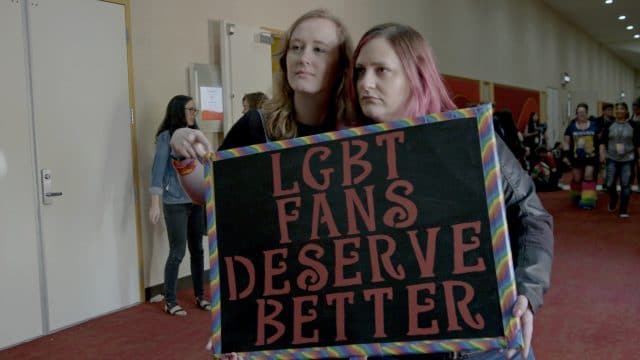
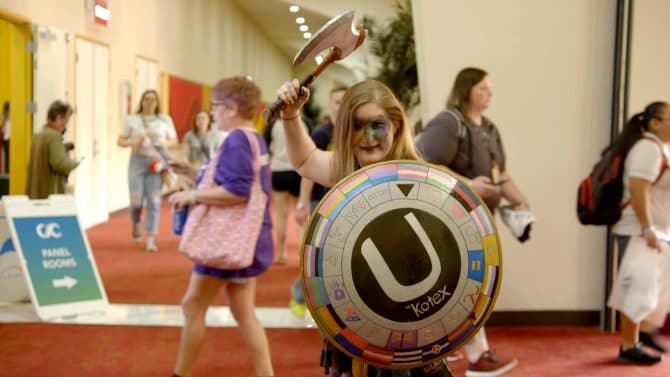
Gabrielle Zilkha has survived fandom, and lived to tell the tale.
Having captured some notice with her first feature documentary, Doing Jewish, about a Jewish community in Ghana, she landed her attention on images of queer people in the media, and the fans that love them. The result, Queering the Script, plays at Outfest July 20.
Queering the Script focuses on the ongoing push for LGBTQ diversity in films and television, and the devoted fandom that springs up every time a character even hints at queerness. Zilkha also explores how limiting depictions of LGBTQ characters to a single race or gender ultimately hurts both fandom and the show itself, or worse: the “Bury Your Gays” phenomenon, which can have a terrible–even deadly–effect on an audience. Yet in the age of Twitter and social media platforms, viewers now have a direct line to the creators of their favorite shows. Queering the Script asks, can this direct line lead to better representation? Can fans direct a show?
Personable and charming, Zilkha speaks with directness and good humor over the phone. Queerty managed to snare some time with her ahead of the big Outfest debut. Queering the Script plays there July 20.
Well, there was no CelexaCon [a fan convention devoted to queer women] in Ghana, so I had to search harder.
[Laughter]
It was a very different path. But, I see similarities in the two films now that I’ve completed them. Doing Jewish, it landed in my lap. It was super personal to me, and it was my first big film. It came through a natural connection. It took five years. I went on a big personal journey through that. With Queering the Script, it was almost the entire opposite. I came to the film because Shaftsbury, which produces Carmilla, was looking for someone to do a documentary about [the show]. That’s actually a great idea; it was a tiny little web series that exploded into fandom.
So there’s a real fun, hero’s journey to that story. But when I met with Steph Ouaknine, who is a producer on the film and on Carmilla, said there is a much bigger story here, and that I should tie it to queer fandom. She asked me “Have you heard of CelexaCon?” And I was like is that a prescription drug?
It really does. Anyway, so she explained over two hours everything about queer fandom she could. Just dumped into my brain. I was so fascinated. Being a queer person, as someone who loves analyzing pop culture and media, it was interesting that I was never a big fan person. We had to film it in a year. They wanted it in less than a year. So it was the opposite of [Doing Jewish] because it was just like and go. So I had to become a student of fandom. There are some communities and subcultures that are very protective. Everyone I talked to, I just asked if I could get some information. People were so generous in teaching me. I found out I wanted to teach other people the way I was taught—so much fun. I wanted to take the joy and laughter and bring an audience into that world too.
No. I think I even had an aversion [to fandom]. I noticed that my reaction to not seeing myself represented in media was to be very resentful.
[Laughter]
So I’ve been in other cultures or subcultures. I turned to art, and wanted to appreciate queer culture. I don’t think I admitted to myself how much it still impacted me. There were moments I was a big fan about something, but I had this aversion to being part of a large group excited about something. When I got through this documentary, I realized that was just the way I reacted to feeling excluded from media I saw. It was so much fun to be around people who just unabashedly love something and allow themselves to feel vulnerable and passionate about.
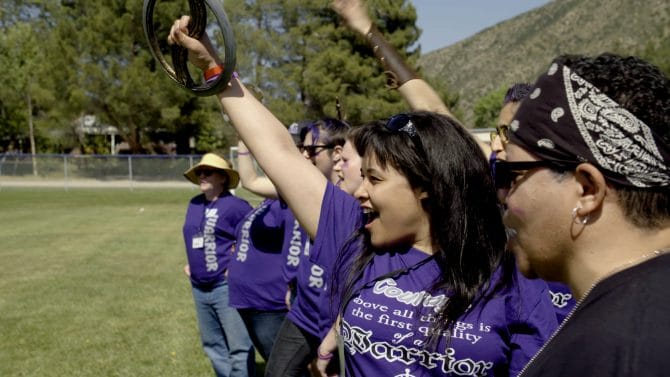 The Xenite Retreat
The Xenite Retreat
It’s what you said. It hit me when I was shooting at the Xenite retreat [a camping retreat for fans of the show Xena: Warrior Princess]. Some of the people I interviewed hadn’t even seen the whole series. They were like it’s not about the show.
[Laughter]
It’s not. We like excuses to get together and feel good and have fun. There was such an accepting vibe. I haven’t been to a ton of Comic-Cons where it could be more bro-ey. Sci-fi fandom has a reputation for being a bit more misogynistic or bro-ey. This is also why I understand how Twitter is fun to people. Before I thought it felt like I was in a mall food court. But now I’m like you’re super having fun watching something together. It a giant inside joke within a community. The best analogy I have is adult summer camp or something.
That’s actually a statistic I gathered from a website called LGBTFansDeserveBetter.com and a few other sites. Different statistics say that. Sometimes statistics can be deceptive. But, when you’re a fan, and this is the media you consume, and all those shows have deaths, that’s your whole world. When this is what you consume this is what you see. You want to watch shows that you relate to. When you only watch shows you related to and see characters die, I think that sends a powerful message. I think too, certain bodies are just treated as dramatic tools. Lesbians and queer women are by no means alone in that.
Yes.
That’s interesting. I remember when I thought about what I grew up seeing, I realized I grew up seeing gay men dying of AIDS on TV, and always having a tragedy. More than women, I think.
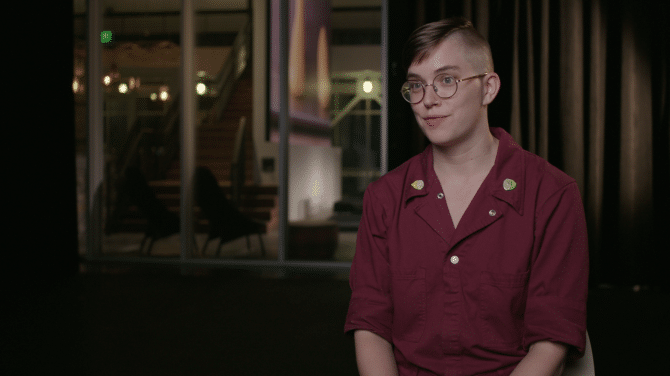 Flourish Klink
Flourish Klink
The L Word. I realized there was a whole lesbian culture. I feel pathetic saying it, but it did make me feel like my life was a little bit more possible. It made being queer cool. Maybe I needed that. I wasn’t a big genre person. I was never big into sci-fi or fantasy, and those genres are cutting edge in terms of representation and diversity and sexuality.
Yeah. My assessment is that is part of the problem. Part of the reason we constructed the film the way we did was that we wanted to end on looking at writer’s rooms and the industry. When you have folks representing themselves, not only do you avoid the tropes, but there’s a certain amount of depth that your characters are afforded that I’m not sure you get when you have someone else writing your story. There’s also this intersection with queer women. Women are dramatic beings; they’re not the default character. And this is changing, but there’s usually a protagonist that’s male and the lead, and the woman is there to support that. When you combine that with someone who is queer, and queer itself is dramatic because it’s conflict. When you overlap woman with queer with dangerous, you just have the perfect recipe for a person to blow up or become a plot point.
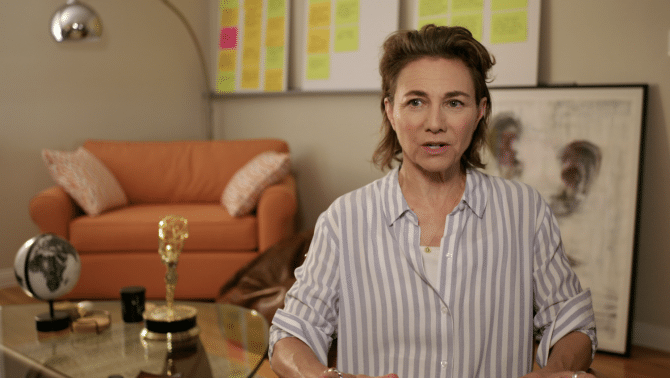 Writer Ilene Chaiken, creator of ‘The L Word’
Writer Ilene Chaiken, creator of ‘The L Word’
If you have more representation [you have more leeway]. If you have more lesbians, you can kill off a lesbian character. A greater scope of representation allows you to do more, but I don’t think you get that unless you let people start to represent themselves.
Great question. The real villain that emerged from the whole Lexa ordeal was Jason Rothenberg, who was showrunner on The 100 and who did a lot of misstepping. I don’t think he really validated the reaction when Lexa died, and subsequently just treated it as internet outrage. I don’t think he really listened to fans of the show and understand it was not about Lexa. With Javi, he was very forthright and open to feedback from the fans and engaged with them. He’s not a pushover. He challenges some of the more hyperbolic claims. But he listened. He didn’t realize how much he traumatized people with this death, and certainly didn’t want to. He understands the impact.
Oh yeah.
Oh God. I have had this conversation with myself in circles for three years. I honestly don’t know. It does look, at times, like platforms will implode from the toxic nature. I had a very big struggle with not putting in the toxic fandom. I felt it needed to be addressed, but as we were going in the story, it didn’t fit. You can’t just fight for representation and then just dogpile people when your ‘ship [fan wishful thinking for a relationship] doesn’t become canon. It felt funny to do a film about fandom and not include moments of embarrassment in fandom.
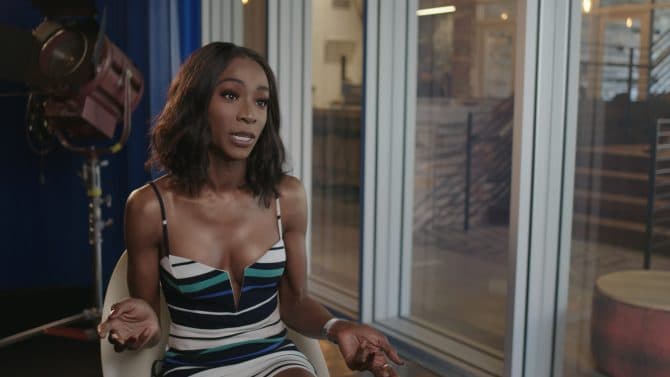 Interviewee Angelica Ross, of ‘Pose’
Interviewee Angelica Ross, of ‘Pose’
But, that, I think, that is more the medium than the fandom. The tools of social media reward the loudest, angriest voices. Always. I’m listening to a podcast about this. There was this dream of the internet and social media of being this democratic tool, this utopic, flat society. And it is. But it’s also an e-high school where bullies win. Where loud voices win. I don’t know how to square that circle. I love that creators are getting feedback on their work. I love that people and companies and shows are being held accountable for what they create. But I really don’t love the outrage machine that rips apart everything and everyone.
The terrifying thing is that people are equipping themselves with this. And it is a machinery. I think conservatives have learned those tools and tactics more. It’s terrifying. I don’t know if we’re going to need moderators. I don’t know if that means we’ll just stick more to our own. It’s a little scary. It definitely comes with good and bad.
That’s so funny. That’s a question I asked every single person in the industry I interviewed. Some of them got it, some of them different. I would find it extraordinarily constricting as a creator. What I noticed is that the folks that rise to the top of the game in the industry…it takes thick skin and resilience and sticking to a vision. I think, by then, folks know the practice of listening to reactions and knowing what to do that’s right. Folks who are creators and writers, or showrunners by the time they’re at the stage of showrunning—that’s not for the faint of heart. They have to fight and be pig headed about what they want.
Also, art is something that is interpreted by the audience. I think it should matter what they say, but ultimately, the elephant in the room is that most of these decisions have been made before fandom gets to see the show. A lot of things are created independent of fan reaction. It’s pretty transparent when creators create something that feels too fan service. Most of the creators I spoke to know their characters so well and know storytelling so well that they can hear the feedback. Fans…you need to treat them respectfully and listen, but they can’t lead.
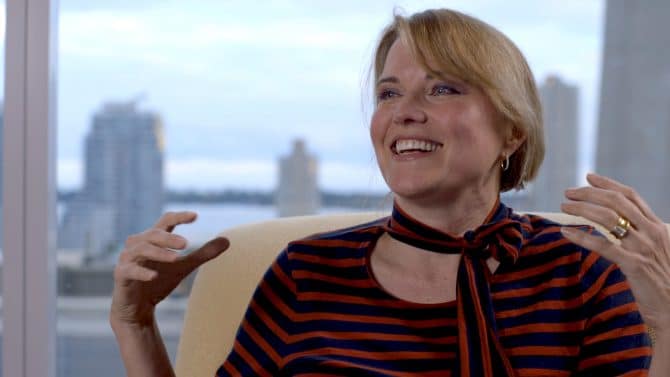 Interviewee Lucy Lawless, of ‘Xena: Warrior Princess’ and ‘Battlestar Galactica’
Interviewee Lucy Lawless, of ‘Xena: Warrior Princess’ and ‘Battlestar Galactica’
There are two narratives I’ve heard about fandom. One is that fans have saved shows, that brought shows back. Fans changing and fighting for their media. The other narrative is that fans think they’re doing this, and it’s really just random network decisions, and that it has nothing to do with fan response. I don’t know if I’ve actually solved that mystery. I do know that fans sometimes react to things–and this is something we put in the film–the creation of media is, a lot of times, a happy accident. Locations are chosen last-minute. Actors get sick. Characters have to be killed off because the actor is going onto another show.
I do feel sometimes fans need to be selective about what times they rally and round up the troops and campaign behind a hashtag, and the times it’s a story they disagree with.
And why not trust creators to do what they want.
You know what I learned about that? Flourish cited Star Wars fans as well–part of [toxic fandom] is we, as fans, invest in a show not just because we like it, but because it reflects something back about us. We learn something about ourselves. We identify with it. When you change that, you’re now in conflict with how I see myself.
Yeah, agreed. We mythologies these properties that don’t really belong to us. And fandom can attract folks who don’t always, necessarily, feel accepted and engaged in mainstream society. So you do get some fringe. And again, the internet rewards and amplifies fringe.
There was a part of me at the very beginning of this project that was like oh my God, these people are effing entitled. And that’s where I found it even more problematic. With queer fandom, sometimes we conflate not having your story told in the way that you want it told with discrimination. That is not fair. We have to be careful; it’s like crying wolf. I get concerned about crying wolf and then people feel like they can’t tell a gay story. It’s like forget it, we’ll drop gay characters altogether.
Yes, that’s a construct like capital. It’s currency. Use it wisely.
Queering the Script plays July 20 at Outfest.







